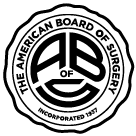American Board of Surgery

Surgery
A Surgeon uses operative measures to treat disease, injuries, and disorders or repair tissues or organs. Surgeons are responsible for the diagnosis and preoperative, operative, and postoperative management of patient care. During the course of the operation, the surgeon makes important decisions about the patient’s health, safety, and welfare, working in cooperation with other members of the surgical team. To acknowledge the specialized activities and interests of individuals wanting to become surgeons, the American Board of Surgery offers primary certification in Surgery and Vascular Surgery. A variety of subspecialty certificates are offered.
Primary Specialty Certificates
Surgery (General Surgery)
A general surgeon has principal expertise in the diagnosis and care of patients with diseases and disorders affecting the abdomen, digestive tract, endocrine system, breast, skin and blood vessels. A general surgeon is also trained in the treatment of patients who are injured or critically ill, and in the care of pediatric and cancer patients. General surgeons are skilled in the use of minimally invasive techniques and endoscopies. Common conditions treated by general surgeons include hernias, gallstones, appendicitis, breast tumors, thyroid disorders, pancreatitis, bowel obstructions, colon inflammation, and colon cancer. Some general surgeons pursue additional training and specialize in the fields of Pediatric Surgery, Surgical Oncology, Vascular Surgery, Trauma Surgery, Hospice and Palliative Medicine, Transplant Surgery, and others.
Vascular Surgery
A vascular surgeon has expertise in the diagnosis and management of patients with disorders of the arterial, venous and lymphatic systems, excluding vessels of the brain and the heart. Certified Vascular Surgeons have significant experience in providing comprehensive care to patients with all types of vascular disease, including diagnosis, medical treatment and reconstructive vascular surgical and endovascular techniques. Common interventions performed by vascular surgeons include the opening of blocked arteries, repair of veins to improve circulation, treatment of aneurysms (bulges) in the aorta and other blood vessels, and treatment of vascular injuries.
Contact the board to learn about specialty and subspecialty certification requirements.
Subspecialties
Complex General Surgical Oncology
A surgeon trained in Complex General Surgical Oncology has expertise in the diagnosis, treatment, and rehabilitation of patients with cancer, especially those with rare, unusual, and/or complex cancers. These surgeons typically work in cancer centers or academic institutions and coordinate patient care with other cancer specialists. They also provide community outreach in cancer prevention and education, as well as lead cancer studies.
Pediatric Surgery
A pediatric surgeon is a general surgeon who has expertise in the diagnosis and care of premature and newborn infants, children and adolescents. This care includes the detection and correction of fetal abnormalities, repair of birth defects, treatment of injuries in children and adolescents, and the treatment of pediatric cancer patients, as well as conditions treated in adults by general surgeons, such as appendicitis, hernias, acid reflux and bowel obstructions.
Surgery of the Hand
A surgeon trained in Surgery of the Hand has expertise in the surgical, medical and rehabilitative care of patients with diseases, injuries, and disorders affecting the hand, wrist and forearm. Common conditions treated by a hand surgeon include carpal tunnel syndrome, trigger fingers, ganglia (lumps), sports injuries to the hand and wrist, and hand injuries involving cut tendons, nerves and arteries. Hand surgeons may be general surgeons, orthopaedic surgeons or plastic surgeons who have received additional training in this area.
Surgical Critical Care
A surgeon trained in Surgical Critical Care has expertise in the diagnosis, treatment and support of critically ill and injured patients, particularly trauma victims and patients with serious infections and organ failure. In addition, these surgeons coordinate patient care among the patient’s primary physician, critical care staff and other specialists.
